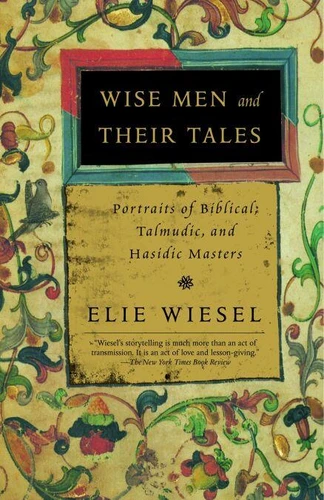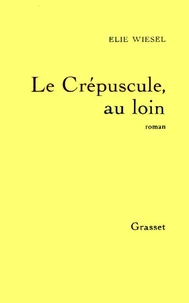Prix Nobel de la Paix 1986.
Wise Men and Their Tales. Portraits of Biblical, Talmudic, and Hasidic Masters
Par :Formats :
Disponible dans votre compte client Decitre ou Furet du Nord dès validation de votre commande. Le format ePub protégé est :
- Compatible avec une lecture sur My Vivlio (smartphone, tablette, ordinateur)
- Compatible avec une lecture sur liseuses Vivlio
- Pour les liseuses autres que Vivlio, vous devez utiliser le logiciel Adobe Digital Edition. Non compatible avec la lecture sur les liseuses Kindle, Remarkable et Sony
- Non compatible avec un achat hors France métropolitaine
 , qui est-ce ?
, qui est-ce ?Notre partenaire de plateforme de lecture numérique où vous retrouverez l'ensemble de vos ebooks gratuitement
Pour en savoir plus sur nos ebooks, consultez notre aide en ligne ici
- Nombre de pages368
- FormatePub
- ISBN978-0-307-56124-4
- EAN9780307561244
- Date de parution16/01/2009
- Protection num.Adobe DRM
- Taille2 Mo
- Infos supplémentairesepub
- ÉditeurSchocken
Résumé
In Wise Men and Their Tales, a master teacher gives us his fascinating insights into the lives of a wide range of biblical figures, Talmudic scholars, and Hasidic rabbis. The matriarch Sarah, fiercely guarding her son, Isaac, against the negative influence of his half-brother Ishmael; Samson, the solitary hero and protector of his people, whose singular weakness brought about his tragic end; Isaiah, caught in the middle of the struggle between God and man, his messages of anger and sorrow counterbalanced by his timeless, eloquent vision of a world at peace; the saintly Rabbi Yehoshua ben Levi, who by virtue of a lifetime of good deeds was permitted to enter heaven while still alive and who tried to ensure a similar fate for all humanity by stealing the sword of the Angel of Death.
Elie Wiesel tells the stories of these and other men and women who have been sent by God to help us find the godliness within our own lives. And what interests him most about these people is their humanity, in all its glorious complexity. They get angry-at God for demanding so much, and at people, for doing so little. They make mistakes. They get frustrated. But through it all one constant remains-their love for the people they have been charged to teach and their devotion to the Supreme Being who has sent them.
In these tales of battles won and lost, of exile and redemption, of despair and renewal, we learn not only by listening to what they have come to tell us, but by watching as they live lives that are both grounded in earthly reality and that soar upward to the heavens.
Elie Wiesel tells the stories of these and other men and women who have been sent by God to help us find the godliness within our own lives. And what interests him most about these people is their humanity, in all its glorious complexity. They get angry-at God for demanding so much, and at people, for doing so little. They make mistakes. They get frustrated. But through it all one constant remains-their love for the people they have been charged to teach and their devotion to the Supreme Being who has sent them.
In these tales of battles won and lost, of exile and redemption, of despair and renewal, we learn not only by listening to what they have come to tell us, but by watching as they live lives that are both grounded in earthly reality and that soar upward to the heavens.
In Wise Men and Their Tales, a master teacher gives us his fascinating insights into the lives of a wide range of biblical figures, Talmudic scholars, and Hasidic rabbis. The matriarch Sarah, fiercely guarding her son, Isaac, against the negative influence of his half-brother Ishmael; Samson, the solitary hero and protector of his people, whose singular weakness brought about his tragic end; Isaiah, caught in the middle of the struggle between God and man, his messages of anger and sorrow counterbalanced by his timeless, eloquent vision of a world at peace; the saintly Rabbi Yehoshua ben Levi, who by virtue of a lifetime of good deeds was permitted to enter heaven while still alive and who tried to ensure a similar fate for all humanity by stealing the sword of the Angel of Death.
Elie Wiesel tells the stories of these and other men and women who have been sent by God to help us find the godliness within our own lives. And what interests him most about these people is their humanity, in all its glorious complexity. They get angry-at God for demanding so much, and at people, for doing so little. They make mistakes. They get frustrated. But through it all one constant remains-their love for the people they have been charged to teach and their devotion to the Supreme Being who has sent them.
In these tales of battles won and lost, of exile and redemption, of despair and renewal, we learn not only by listening to what they have come to tell us, but by watching as they live lives that are both grounded in earthly reality and that soar upward to the heavens.
Elie Wiesel tells the stories of these and other men and women who have been sent by God to help us find the godliness within our own lives. And what interests him most about these people is their humanity, in all its glorious complexity. They get angry-at God for demanding so much, and at people, for doing so little. They make mistakes. They get frustrated. But through it all one constant remains-their love for the people they have been charged to teach and their devotion to the Supreme Being who has sent them.
In these tales of battles won and lost, of exile and redemption, of despair and renewal, we learn not only by listening to what they have come to tell us, but by watching as they live lives that are both grounded in earthly reality and that soar upward to the heavens.






















